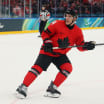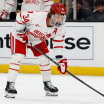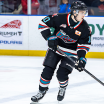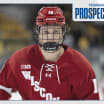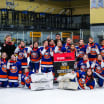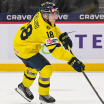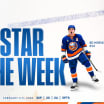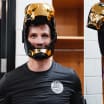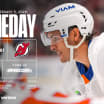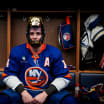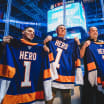It took a while for me to get to know Denis Potvin -- and the vice was versa.
I'd say it required a grand total of six interviews, give or take three. (For me, it all depended on whether the Islanders won or lost.)
As the super-headliner draftee of 1973 -- nobody else was even close -- the husky French-Canadian defenseman from Hull, Quebec already was a pro when it came to media-dueling.
Maven's Memories: Writing a Book with Denis Potvin
Stan Fischler on the experience of helping write Denis Potvin's 1977 autobiography Power on Ice
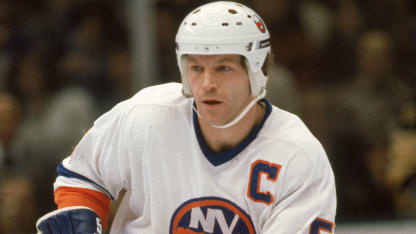
© B Bennett/Getty Images
By
Stan Fischler
Special to NHL.com
Then he simply refined the art of engaging the press as I quickly learned while doing the SportsChannel interviews between periods during Islanders home games at Nassau Veterans Memorial Coliseum.
Being that Potvin had learned the NHL game so fast and so well, it was only natural for my tv producer, Stan Epstein, to invite Denis before the cameras as often as possible.
"The fans want to see and hear Potvin," Epstein would say, "so bring him on, let him be our guest. If we win -- and he's the star -- bring him on post-game. He's the man!"
That happened a lot because Denis began skating to major league stardom the moment he stepped on NHL ice.
It was as a result of these interviews that the future Hall of Famer and I eventually collaborated on Denis' autobiography; but I'll get to that in a minute.
No time at all was required for Potvin to develop a "style" when appearing before a camera and microphone. By our third post-game interview, I had figured out The Potvin Effect. It generally went like this:
Denis would be escorted to our tv studio, walk in with a smile and a greeting, take a seat and then, suddenly, his brow would furrow just a bit so as to be noticeable and a "get serious" look flashed from his eyes.
"He always seemed concerned that the first question was going to be something out of left field," producer Epstein once observed. "But once you hit him with a reasonable query, he was just fine."
Actually, he was better than "just fine." As we used to say in Old Brooklyn, "The guy has a good head on his shoulders." His insights were pure and delivered with eloquence. He became our best interview.
"He sounded like he went to broadcasting school," said Mark Berlinsky who stage-managed many of our post-game shows.
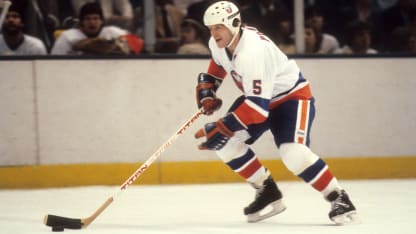
By the end of Potvin's freshman season -- no, surprise, he won the Calder Memorial Trophy as rookie-of-the-year -- Denis and The Maven had bonded.
"I like talking to you," he once offhandedly said, and I told him that the feeling was mutual.
This was in June 1976 after Potvin's third season in the National Hockey League. By that time he had absorbed a good chunk of New York sophistication and business acumen.
He had hooked on with a Madison Avenue-type marketing outfit -- even though the office was at 919 Third Avenue -- and even had his shingle, Denis Potvin, Ltd., on the door.
"I had looked into the marketing field thanks to a couple of friends," he explained, "and I liked the feel of the business. I already was a success on ice and now I planned to prepare for an after-hockey life."
One vehicle that can put a captivating personality on the Thruway to marketing success is a book. Somebody at Potvin's People and Properties office once said, "Denis, why don't you do a book?"
Potvin was agreeable and checked out my writing credentials. By 1976, I already had ghosted books for the Boston Bruins' Derek Sanderson, not to mention the Rangers' Brad Park plus Rod Gilbert.
When Denis agreed on our collaboration we met with Harper & Row editor Joe Vergara. Our hope was to sell the publishing company on the idea of a Denis Potvin autobiography.
But there were problems to be questioned and answered.
1. After only four years in the NHL, would Denis have enough to say about hockey and life to make the project worthwhile?
2. Would Denis, a French-Canadian, have sufficient mastery of English to deliver his points accurately?
3. Would he have enough time during the heat of the NHL homestretch to work on the book?
Those very questions suggested that the project would be difficult. But, Denis being Denis, all the negatives were turned into positives. Not only was his English impeccable it was more polished than mine.
Although finding time was a challenge, Potvin made time: much more so than other athletes with whom I previously had collaborated. Better still, by 1976, Denis had reached All-Star status.
"In Potvin's third year," said Associated Press beat writer Barry Wilner, "Denis had become the best defenseman in hockey."
And that's how we started the book.
!
Convening at Potvin's apartment, we decided that the opening chapter needed a dose of pepper. We titled it "Denis, You Are The Best"
The headline fit since Potvin had beaten out Bobby Orr for the Norris Trophy as the NHL's best defenseman. "It was," Denis would admit in print, "the biggest moment in my life up to that point."
Right off the bat, we ignited a good-natured-but-hard-nosed literary rivalry with Boston's all-time hockey icon, Orr. What's more we had more to say on Potvin vs. Orr later on in the book.
Next we had to flash back to Denis' youth, his very wonderful and well-knit family and the fact that his first pair of skates already had passed through his father's playing days and then two brothers, Bob and Jean.
"By the time I got them," Denis recalled, "the skates were not in the best of shape. They were poorly insulated against the cold (which we had plenty of in Ottawa) and to keep warm I'd sprinkle a lot of pepper inside the boot."
At this point in putting together the manuscript the key was Potvin's ability to accurately remember stories from his childhood. Lucky me, he had a photographic memory, even when it came to watching tv hockey.
Denis: "Before the Montreal game went on I'd gather a bunch of pillows, place them on the floor in front of the TV set, and begin sweating. I took my team -- the Canadiens -- very seriously right from the start."
Chapter Three came naturally; it was all about his other brother, Jean, who had a profound influence on Denis' life, both at home and later in Junior hockey and, finally, with the Islanders.
"The tight brotherly bond between Jean and me was cemented at an early age," Denis remembered. "We spent our summers together at the family cottage on the Ottawa River about 20 miles from home."
As my visits to collect book information began piling up, I was most impressed with my buddy's ability to detail episodes. One of them was about how he saved Jean who had fallen out of a tree.
Others, which formed yet another chapter, were about Denis adventures in the Junior hockey wars, and even the differences between he and Big Brother Jean. Nor did Denis have any qualms about explaining their differences.
"Jean never had a mean streak when he was on the ice. That aspect of his play hurt him; he was never a hitter. But if somebody took a run at me, Jean would be right on the guy's back, giving it to him. He could really fight"
Not all of my book interviews with Denis were done at his apartment. Once in a while we'd dine together and he'd weave a few stories that proved useful to the narrative.
One intriguing tale was about his "split" with Jean. It happened in September 1969. "For the first time in my hockey career, brother Jean wasn't in Ottawa to give me physical support and guidance."
Jean had been signed by the Los Angeles Kings and farmed out to their Springfield farm team. As Denis reflected about the brotherly "split," I could sense -- though many years had gone by -- that it still affected kid brother.
Denis' affection for Jean was apparent throughout our tapings -- and even more apparent when they were reunited in Uniondale. He also made it clear that once Jean turned pro, he -- the kid brother -- had to grow up.
He proudly pointed out to me that his years with the (Junior) Ottawa 67s gave him maturity along with his growing skill. Eventually our discussions about Bobby Orr caused Denis to speak more intensely than usual.
"I was disturbed in my final year of Junior hockey to read the headlines in both the English and French papers saying that I was 'The next Bobby Orr.' And when a reporter asked if that bothered me, I told him straight out:
"Yes, it does. There's Bobby Orr and there's me, Denis Potvin. Orr does things I don't do and I do things he doesn't do. You can't compare us. I don't want everybody measuring me against Orr."
Still, it made good reading and we agreed on the chapter title: "He's another Bobby Orr -- Ugh!"
MAVEN'S MEMORIES
WRITTEN COVERAGE
From Viking to Uniondale, the Sutter Bros
Bob Bourne's End to End Rush
Mikko Makela: The Flying Finn
Stan's 17 Birthday Memories
Jason Blake Played Big
Shirley Fischler Breaks Gender Barriers
Jim Devellano, The Other Architect
The 2003-04 Season
Mike Bossy's Road to the Islanders
The 2002-03 Homestretch
John Tonelli Five-Goal Game
Isles vs Leafs in 2002
Maven's Haven
Eventually the tape recorder gathered details of Islanders GM Bill Torrey's deal that brought Jean Potvin to Nassau before Denis was drafted. Bow Tie Bill knew that with Jean on the Island, Denis would want to be there too.
Then, we also discussed the heavy pressure Canadiens GM Sam Pollock put on Torrey in an attempt to wrest the first pick over to the Habs for a collection of Sammy Pollock's Canadiens.
As everyone expected Torrey picked Denis first overall and he showed up at training camp in the fall of 1973. This was a huge deal for Denis, a big deal for the club; not to mention the media.
At this point in our taping, Denis momentarily paused during his brainstorming. He then addressed his pivotal first meeting with Captain Ed Westfall, the Islanders version of head counselor at camp.
Denis: "Eddie spotted me immediately. Our eyes met and I awaited his reaction. It was quick and warm. 'Welcome to the Islanders!' he shouted, pumped my hand and before I knew it, invited me out for a round of golf.
"How could I refuse? Eddie and I became good friends right from the start. It was a tremendous feeling, having an old pro like Westfall treat a raw rookie like his brother. He impressed me more than anyone else on the team."
One of the things I learned about Denis as we progressed toward the end of our tapings was his unvarnished honesty about even the most embarrassing events.
He took full blame for once missing the team bus -- and game against the Flyers in Philly -- as well as problems in his rookie NHL season. Then he brushed up on his Shakespeare with an "All's well that ends well" conclusion.
After all, what could be better than winning the Calder Memorial Trophy as rookie of the year? On the other side, he explained clashes with the likes of Brad Park, Bryan Watson and Dave Schultz; it was all part of the war game on ice.
For the most part, our tete-a-tetes were conducted with what my late Uncle Joe would call "revolutionary decorum," but every so often Denis would betray emotion about a subject. One was his affection for teammates. To wit:
"I love the Islanders," he once blurted. "There isn't a single guy on the team I wouldn't defend in any situation -- in a bar, in a game or in print. If there's a hassle with one of our guys on the ice, and he's getting the worst of it, I'll jump in."
Another of Potvin's more emotional moments involved his play-by-play of the 1975 playoff upset of the Rangers. That was followed by the team's comeback from being down three games to none against Pittsburgh.
We agreed that the four-win comeback over the Penguins deserved a chapter titled: "They said it couldn't be done."
Arguably, the most emotional moment of our many exchanges came near the end. It was all about Potvin's first 30-goal season and what happened once he saw the red light flash, signaling Number Thirty.
"People say that men should never be ashamed to cry in public if they have good reason. But this is not an easy thing to do. You always want to give the impression of being masculine. This time I couldn't restrain myself."
Then, another pause for contemplation: "When I saw the Islanders fans clapping and then rising from their seats to give me a standing ovation, I remembered the guy who had told me once why fans don't take me as easily as they do more charismatic players.
"'You're maddening,' the guy said. 'because everything on the ice looks easy for you.' What he didn't know was that I die out there a lot of the time."
Then, he told me that, yes, he was weeping but he was embarrassed that the tv and newspaper cameras had been trained on him. He desperately wanted to hide his head from them.
In retrospect, it seems a bit odd that the finished product, "Power On Ice," was published in 1977, before Denis captained the isles to four consecutive Stanley Cup victories.
Those four championships were twice as many as Bobby Orr accomplished in Boston. That's why Denis and The Maven agreed to close our last chapter with a punch line. It went exactly like this:
"All of a sudden the years of inner fury at being called 'The Next Bobby Orr' seemed worthwhile!"

